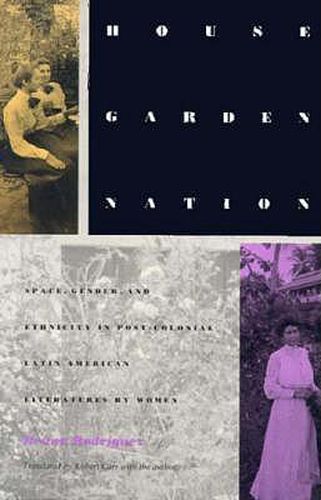Readings Newsletter
Become a Readings Member to make your shopping experience even easier.
Sign in or sign up for free!
You’re not far away from qualifying for FREE standard shipping within Australia
You’ve qualified for FREE standard shipping within Australia
The cart is loading…






How ironic, the author thought on learning of the Sandinista’s electoral defeat, that at its death the Revolutionary State left Woman, Violeta Chamorro, located at the center. The election signaled the end of one transition and the beginning of another, with Woman somewhere on the border between the neo-liberal and marxist projects. It is such transitions that Ileana Rodriguez takes up here, unraveling their weave of gender, ethnicity, and nation as it is revealed in literature written by women.
In House/Garden/Nation the narratives of five Centro-Caribbean writers illustrate these times of transition: Dulce Maria Loynaz, from colonial rule to independence in Cuba; Jean Rhys, from colony to commonwealth in Dominica; Simone Schwarz-Bart, from slave to free labor in Guadeloupe; Gioconda Belli, from oligarchic capitalism to social democratic socialism in Nicaragua; and Teresa de la Parra, from independence to modernity in Venezuela. Focusing on the nation as garden, hacienda, or plantation, Rodriguez shows us these writers debating the predicament of women under nation formation from within the confines of marriage and home.
In reading these post-colonial literatures by women facing the crisis of transition, this study highlights urgent questions of destitution, migration, exile, and inexperience, but also networks of value allotted to women: beauty, clothing, love. As a counterpoint on issues of legality, policy, and marriage, Rodriguez includes a chapter on male writers: Jose Eustacio Rivera, Omar Cabezas, and Romulo Gallegos. Her work presents a sobering picture of women at a crossroads, continually circumscribed by history and culture, writing their way.
$9.00 standard shipping within Australia
FREE standard shipping within Australia for orders over $100.00
Express & International shipping calculated at checkout
How ironic, the author thought on learning of the Sandinista’s electoral defeat, that at its death the Revolutionary State left Woman, Violeta Chamorro, located at the center. The election signaled the end of one transition and the beginning of another, with Woman somewhere on the border between the neo-liberal and marxist projects. It is such transitions that Ileana Rodriguez takes up here, unraveling their weave of gender, ethnicity, and nation as it is revealed in literature written by women.
In House/Garden/Nation the narratives of five Centro-Caribbean writers illustrate these times of transition: Dulce Maria Loynaz, from colonial rule to independence in Cuba; Jean Rhys, from colony to commonwealth in Dominica; Simone Schwarz-Bart, from slave to free labor in Guadeloupe; Gioconda Belli, from oligarchic capitalism to social democratic socialism in Nicaragua; and Teresa de la Parra, from independence to modernity in Venezuela. Focusing on the nation as garden, hacienda, or plantation, Rodriguez shows us these writers debating the predicament of women under nation formation from within the confines of marriage and home.
In reading these post-colonial literatures by women facing the crisis of transition, this study highlights urgent questions of destitution, migration, exile, and inexperience, but also networks of value allotted to women: beauty, clothing, love. As a counterpoint on issues of legality, policy, and marriage, Rodriguez includes a chapter on male writers: Jose Eustacio Rivera, Omar Cabezas, and Romulo Gallegos. Her work presents a sobering picture of women at a crossroads, continually circumscribed by history and culture, writing their way.